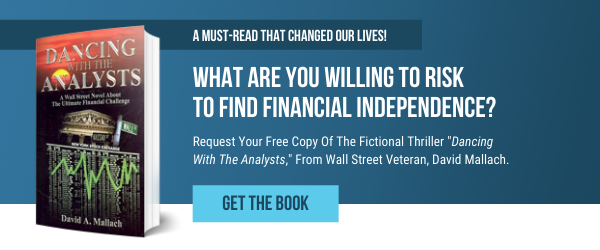While throwing money into a savings account is crucial to building your emergency funds, this alone won’t set you up for financial success. The truth is, the earlier you start investing (in anything), the more successful you’ll be.
Below, we’ll explore five questions about investing and their answers so you can begin now rather than later.
Question 1: How Much Money Do I Need To Start Investing?
Of all the questions, “How much do I need to begin?” is what we hear the most. The answer? One dollar!
Of course, more if you can. However, it doesn't really matter how much money you have available to invest. The most important thing is not about the dollar amount, it's about the amount of time that you have to invest money. By getting started earlier, you’ll have more time to invest.
Investing consistently will help you build a successful portfolio that pays off in the long run. This is because success breeds success.
Question 2: How Much of My Paycheck Should I Save?
The bigger portion of your paycheck you can put aside to invest and still live comfortably, the better. You’ll need to calculate how much money from each paycheck goes to pay your bills and other mandatory expenses before you know how much money to save. Pay yourself first before you spend any money on discretionary (non-essential) items.
We see that people who consistently put away around 30% of their income are able to reach the goals they have defined in their financial plan. That may or may not be possible for you. Also, there is no set maximum percentage you can save. If you can invest 95% and live on 5% of your paycheck, that’s even better!
However, if we’re referring to your retirement plan, there are other factors that come into play. For example, there is a limit in terms of how much money you’re actually allowed to put away per year for retirement dictated by the IRS. If your company matches your 401(k), consider taking full advantage of it, because that’s “free money” to you.
Question 3: How Can Kids Start Investing?
Kids need your help with building financial discipline, especially when learning about saving for long-term goals.
If they are of working age and have a job, you can help them organize their finances by setting up an auto debit directly from their paycheck that goes into an investment account or a savings account so this process becomes a habit early in life.
You can further motivate your kids by educating them about investing. For example, you can explain that consistent investing is the same as any other healthful habit they pursue.
If you’re worried about your child having access to say, $50,000, when they’re sixteen, there are other types of accounts you can consider. A custodial account allows you, as the parent or guardian, to make decisions on the account until the account owner is considered an adult. This age varies by state, but is typically 18 or 21.
Question 4: How Do I Go About Explaining Investing To Kids?
If you have younger children, you can build their excitement by taking them to a bank so they can see the process as you open an individual account in their name. Talk to them about the importance of saving money — even just a few dollars every week — so they can, for example, use that saved money to buy something they really want, or donate to an important cause.
Next, emphasize that any money they have invested properly will be more money in the future. When explaining investing to kids, consider using examples to which they can relate. Money-related board games — like Monopoly — can help your children understand the importance of handling money with a focus on a larger objective.
Question 5: How Can Beginning Entrepreneurs Invest In Their Retirement?
The knee-jerk answer that you might expect from a firm like ours is, “You absolutely want to set up a retirement plan for yourself and start investing as much money as you can.” This is the conventional wisdom. Yes, as your business grows, you may find tax advantages to setting up a retirement plan. Retirement plans are also good for attracting and keeping employees.
However, you are your best investment. If you’re an individual entrepreneur, invest in yourself and make that business work. Without a doubt, your business can become your greatest asset. Grow the heck out of your business, and thank us — and yourself — later. Once you have a solid cash flow, you will be able to fund your financial plan.
Take Control of Your Future
Now is the time to get started on the road to financial success. Having a good financial advisor who has your back and will tell it to you straight, is a great way to begin your journey.
Make your money work for you. Explore our investment management solutions today.

